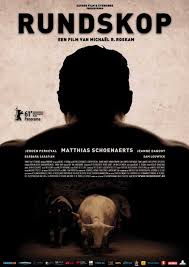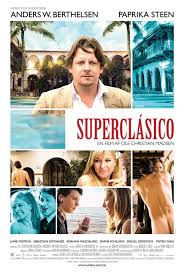And so, six days before the Oscar Nominations Morning, we finally get the finalist list for the Foreign Language category. I don't know if I've ever written about it here, but this is routinely one of the most fascinating categories for me, even more so than some of the major ones. There's a lot more going on here than in, say, Best Supporting Actor, because there's an added layer of global politics involved that makes for some very interesting choices. Its also a deeply flawed system. The submission process makes it difficult for some films to break out, and the reasoning behind some disqualifications is sketchy. For example, Albania's Forgiveness of Blood was disqualified this year because director Joshua Marston is American, and therefore the film was not "sufficiently Albanian" (curiously, this happened to Marston back in 2004 when Colombia submitted Maria Full of Grace; in both cases, the country submitted a different film).
I also have a big problem with the way that the Oscar is credited to the film's nation of origin, rather than to its producers/director. This problematic when you have a case like this year, when Iran's A Separation will likely be nominated. Yes, the film has been hailed a masterpiece, but should a nation that routinely violates human rights and, in relevance to this blog, persecutes filmmakers be rewarded with one of cinema's highest honors? It's Asghar Fahardi, not Iran, that deserves the Oscar.
And all of this is to say nothing of the obvious favoritism toward European cinema, particularly those countries west of the former Iron Curtain. France and Italy together account for over nearly half of this category's total nominations, and, to date, Argentina is the only nation outside of Europe with multiple Oscars. Its true that cinema was born in Europe, and that some of its most significant advancements came from European filmmakers, but now that many nations - first, second, and third-world - have the capability to make films, their artistic merits should be taken seriously as well.
These are, I suppose, complaints, but I have these complaints because I care about the category. And every year's nominees go on my watch list immediately, as I hope that they'll soon make their to my area or DVD. Its flawed, but magnificently so.
Anyway, this year's nine finalists include an interesting swath of films from different parts of the world, a few surprise inclusions and several surprising exclusions. The films vying for the five nominations are:
 Bullhead, Belgium (5 nominations/0 wins)
Bullhead, Belgium (5 nominations/0 wins)
Belgium's submission was marked with controversy, since many believed they would choose the Dardenne Brothers' well-received The Kid with the Bike. The film is supposedly about cattle ranchers who are involved with the mob. I'm not convinced, though, that its going to make the final cut.
 Monsiuer Lazhar, Canada (5 nominations/1 win)
Monsiuer Lazhar, Canada (5 nominations/1 win)
Canada was nominated last year for Incendies, and this film seems to cover similar thematic material with a story about an Algerian immigrant who becomes a school teacher. This seems to be a hot topic with the foreign branch, and Canada's hitting their sweet spot. This isn't a sure-thing for a nomination, but it's certainly a dark horse candidate.
 Superclasico, Denmark (8 nominations/3 wins)
Superclasico, Denmark (8 nominations/3 wins)
The reigning champion of this category makes it back onto the finalist list, this time with a marital comedy starring European superstar Paprika Steen. Comedy, as in the rest of Oscars, don't usually get much respect here, so a nomination would be very interesting indeed.
 Pina, Germany (16 nominations/3 wins)
Pina, Germany (16 nominations/3 wins)
Germany dominated the last decade of this category, and this seems like a sure-thing to be nominated. Directed by the legendary Wim Wenders, this would be the first documentary to ever be nominated in this category, as it serves as a tribute to late choreographer Pina Bausch. Interestingly, its also on the finalist list for Best Documentary Feature; will that hurt its chances here? I'd say unlikely, but this is unprecedented.
 A Separation, Iran (1 nomination/0 wins)
A Separation, Iran (1 nomination/0 wins)
A nomination for this film is inevitable. I wouldn't necessarily chalk the win up to it just yet; voters in this category are notorious for passing over critically acclaimed films for popular or populist feel-good films (see: Departures winning over Waltz with Bashir in 2008). I really can't wait to see this, and like Pina, it could score multiple nominations: its still a possible contender for Best Original Screenplay.
 Footnote, Israel (9 nominations/0 wins)
Footnote, Israel (9 nominations/0 wins)
In 2009, with the nomination of Ajami, Israel officially passed Poland as the most nominated nation to never win the Oscar. In the past five years, Israel was nominated three times, so the nation clearly has some heat with this branch. And this film won Best Screenplay at Cannes last year. On a side note, I'm actually taking a class on Israeli cinema this semester, so a nomination would be fun.
 Omar Killed Me, Morocco (0 nominations/0 wins)
Omar Killed Me, Morocco (0 nominations/0 wins)
Interestingly, this film comes from the same team that made recent Algerian nominees Days of Glory and Outside the Law. The story of a man who may be wrongfully imprisoned, it fits with those films thematically, which may be what voters responded to. Out of all the finalists, Morocco is the only one seeking its first nomination.
 In Darkness, Poland (8 nominations/0 wins)
In Darkness, Poland (8 nominations/0 wins)
As I mentioned above, Poland has long been awaiting its first Oscar win as well. And this film would certainly be foolish to count out: its a Holocaust drama by Agnieska Holland, who was previously nominated for writing Europa Europa. If there's any film that could beat A Separation for the Oscar, its this one (on paper, at least).
 Warriors of the Rainbow: Seediq Bale, Taiwan (3 nominations/1 win)
Warriors of the Rainbow: Seediq Bale, Taiwan (3 nominations/1 win)
This war epic about indigenous tribes fighting off an invading Japanese force is something of a surprise, since I've heard very little discussion about it until now. I doubt the fill will get nominated, but if it does, it would be the first Taiwanese nominee to not be directed by Ang Lee (this film is the work of Wei Te-sheng).
So who got left out? Most notably, Lebanon's Where Do We Go Now?, which won the audience prize at Toronto International Film Festival last year. Mexico's Miss Bala was also glaringly absent, perhaps the result of its erratic release strategy. Brazil's Elite Squad 2 - a massive domestic success - was considered a strong possibility, as was China's The Flowers of War, which was directed by the great Zhang Yimou and featured recent Oscar winner Christian Bale. France's Declaration of War - a cancer dramedy - was passed over (reminiscent of last year's snub for Of Gods and Men), and Finland's Le Havre didn't register with voters either, it seems. Turkey's Once Upon a Time in Anatolia also surprisingly missed the cut (was Rick Perry voting?). And Russia couldn't land on the list with Burnt by the Sun 2, the sequel to the nation's 1994 Oscar winner.
My predictions:
Superclasico
A Separation
Pina
Footnote
In Darkness
I also have a big problem with the way that the Oscar is credited to the film's nation of origin, rather than to its producers/director. This problematic when you have a case like this year, when Iran's A Separation will likely be nominated. Yes, the film has been hailed a masterpiece, but should a nation that routinely violates human rights and, in relevance to this blog, persecutes filmmakers be rewarded with one of cinema's highest honors? It's Asghar Fahardi, not Iran, that deserves the Oscar.
And all of this is to say nothing of the obvious favoritism toward European cinema, particularly those countries west of the former Iron Curtain. France and Italy together account for over nearly half of this category's total nominations, and, to date, Argentina is the only nation outside of Europe with multiple Oscars. Its true that cinema was born in Europe, and that some of its most significant advancements came from European filmmakers, but now that many nations - first, second, and third-world - have the capability to make films, their artistic merits should be taken seriously as well.
These are, I suppose, complaints, but I have these complaints because I care about the category. And every year's nominees go on my watch list immediately, as I hope that they'll soon make their to my area or DVD. Its flawed, but magnificently so.
Anyway, this year's nine finalists include an interesting swath of films from different parts of the world, a few surprise inclusions and several surprising exclusions. The films vying for the five nominations are:
Belgium's submission was marked with controversy, since many believed they would choose the Dardenne Brothers' well-received The Kid with the Bike. The film is supposedly about cattle ranchers who are involved with the mob. I'm not convinced, though, that its going to make the final cut.
Canada was nominated last year for Incendies, and this film seems to cover similar thematic material with a story about an Algerian immigrant who becomes a school teacher. This seems to be a hot topic with the foreign branch, and Canada's hitting their sweet spot. This isn't a sure-thing for a nomination, but it's certainly a dark horse candidate.
The reigning champion of this category makes it back onto the finalist list, this time with a marital comedy starring European superstar Paprika Steen. Comedy, as in the rest of Oscars, don't usually get much respect here, so a nomination would be very interesting indeed.
Germany dominated the last decade of this category, and this seems like a sure-thing to be nominated. Directed by the legendary Wim Wenders, this would be the first documentary to ever be nominated in this category, as it serves as a tribute to late choreographer Pina Bausch. Interestingly, its also on the finalist list for Best Documentary Feature; will that hurt its chances here? I'd say unlikely, but this is unprecedented.
A nomination for this film is inevitable. I wouldn't necessarily chalk the win up to it just yet; voters in this category are notorious for passing over critically acclaimed films for popular or populist feel-good films (see: Departures winning over Waltz with Bashir in 2008). I really can't wait to see this, and like Pina, it could score multiple nominations: its still a possible contender for Best Original Screenplay.
In 2009, with the nomination of Ajami, Israel officially passed Poland as the most nominated nation to never win the Oscar. In the past five years, Israel was nominated three times, so the nation clearly has some heat with this branch. And this film won Best Screenplay at Cannes last year. On a side note, I'm actually taking a class on Israeli cinema this semester, so a nomination would be fun.
Interestingly, this film comes from the same team that made recent Algerian nominees Days of Glory and Outside the Law. The story of a man who may be wrongfully imprisoned, it fits with those films thematically, which may be what voters responded to. Out of all the finalists, Morocco is the only one seeking its first nomination.
As I mentioned above, Poland has long been awaiting its first Oscar win as well. And this film would certainly be foolish to count out: its a Holocaust drama by Agnieska Holland, who was previously nominated for writing Europa Europa. If there's any film that could beat A Separation for the Oscar, its this one (on paper, at least).
This war epic about indigenous tribes fighting off an invading Japanese force is something of a surprise, since I've heard very little discussion about it until now. I doubt the fill will get nominated, but if it does, it would be the first Taiwanese nominee to not be directed by Ang Lee (this film is the work of Wei Te-sheng).
So who got left out? Most notably, Lebanon's Where Do We Go Now?, which won the audience prize at Toronto International Film Festival last year. Mexico's Miss Bala was also glaringly absent, perhaps the result of its erratic release strategy. Brazil's Elite Squad 2 - a massive domestic success - was considered a strong possibility, as was China's The Flowers of War, which was directed by the great Zhang Yimou and featured recent Oscar winner Christian Bale. France's Declaration of War - a cancer dramedy - was passed over (reminiscent of last year's snub for Of Gods and Men), and Finland's Le Havre didn't register with voters either, it seems. Turkey's Once Upon a Time in Anatolia also surprisingly missed the cut (was Rick Perry voting?). And Russia couldn't land on the list with Burnt by the Sun 2, the sequel to the nation's 1994 Oscar winner.
My predictions:
Superclasico
A Separation
Pina
Footnote
In Darkness
Comments